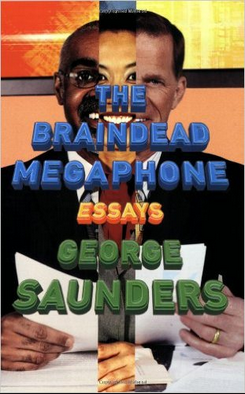“The shortfall between the imagined and the real…”
Hello, friends. I might be one of the last adults in the Western world to discover George Saunders but it’s happened at last. I am so glad it has!
In 2008, shortly after I had my son, my dear friends K and A gave me a copy of Saunders’s essay collection, The Braindead Megaphone. The timing was less than ideal. I had a newborn who seemed never to sleep, I was recovering from a complicated and frightening childbirth ordeal, and when I tried to read the first paragraph of the title essay, I could actually feel the exact moment his words bounced off my brain. Also, I hated the cover. It blared at me in just the way Braindead Megaphone Guy blares at everyone, which I realize is the point, but at the time all I wanted to do was burn it. In the end, Nick shelved it somewhere lowdown and easily ignored and I didn’t think of it for eight years.

This past week, I read a very funny and close-to-the-bone short story in the New Yorker and realized, after the fact, that it was by Saunders. It was so good that I ended up poking around the dusty bookshelves near the woodstove and recovering my copy of The Braindead Megaphone. It’s now nine years old and the title essay, which meditates on news coverage of the Iraq War, should be out of date. And yet it’s not. Here’s what I mean:
Our venture in Iraq was a literary failure, by which I mean a failure of imagination. A culture better at imagining richly, three-dimensionally, would have had a greater respect for war than we did, more awareness of the law of unintended consequences, more familiarity with the world’s tendency to throw aggressive energy back at the aggressor in ways he did not expect. A culture capable of imagining complexly is a humble culture. It acts, when it has to act, as late in the game as possible, and as cautiously, because it knows its girth and the tight confines of the china shop it’s blundering into. And it knows that no matter how well-prepared it is – no matter how ruthlessly it has held its projections up to intelligent scrutiny – the place it is headed for is going to be very different from the place it imagined.
This is the sharpest, most compassionate, most acerbic reflection on conflict and culture I’ve read in some time – and I’ve been doing a lot of reading about war and its involutions. I had to sit quietly for a minute, after reading that. And then I turned to the last sentence in the paragraph:
The shortfall between the imagined and the real, multiplied by the violence of one’s intent, equals the evil one will do.
That sentence summarizes, far more eloquently than I ever have, the novel I’m writing right now. It’s something I’ll continue to reflect upon, as I continue my work. And oh, I am grateful to be in the presence of a furious, insightful, spiky, large-hearted thinker such as this.
I’ll probably turn to Saunders’s fiction next. Do you have any particular recommendations?



